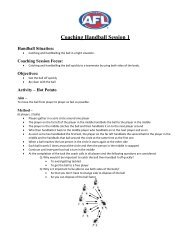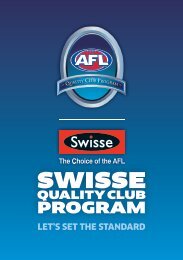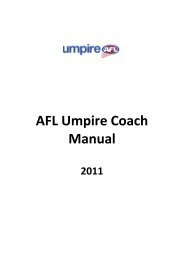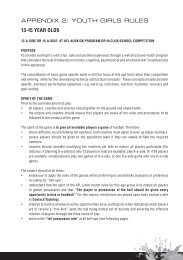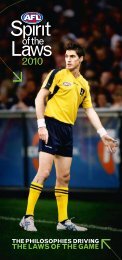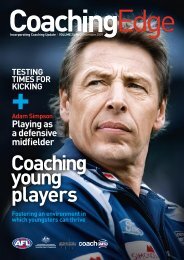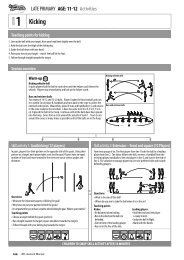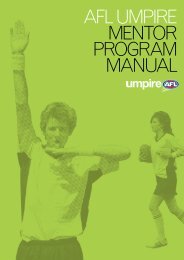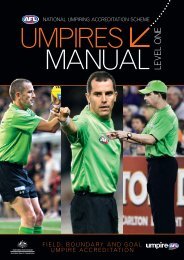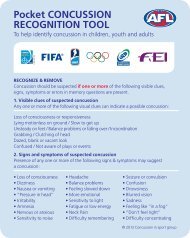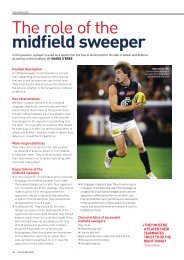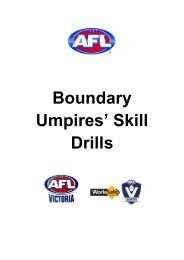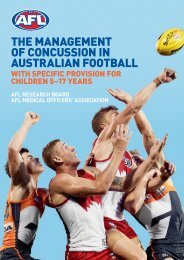Coaching Edge - AFL Community
Coaching Edge - AFL Community
Coaching Edge - AFL Community
Create successful ePaper yourself
Turn your PDF publications into a flip-book with our unique Google optimized e-Paper software.
This program was developed to assist young ruckmen<br />
playing with a team in the under-18 TAC Cup. The<br />
six-week program was to help each ruckman<br />
learn some basic techniques and improve their<br />
understanding of the game and their position. I shared<br />
some of the experiences from my <strong>AFL</strong> career and gave<br />
them some key points and goals to help them develop.<br />
SESSION FOUR<br />
Follow-Up Work, Second<br />
and Third Efforts, Spread<br />
Session aims<br />
To make the ruckmen aware of how<br />
important it is to follow up their ruckwork<br />
and compete once the ball has hit the<br />
ground. Also the importance of leaving the<br />
area of stoppage quickly (spreading) to<br />
become another midfielder.<br />
Equipment required<br />
A ruckbag, two tackle bags and four footballs.<br />
Description of activities<br />
Using drills the ruckmen have worked on<br />
previously but adding in repeat efforts once<br />
the ball has hit the ground. First get ruckmen<br />
to jump into ruckbag, palming the ball down<br />
then roving the hit, giving a handball to a<br />
coach, then quickly running to the tackle bag,<br />
which has a football sitting on top. Taking the<br />
tackle bag to ground, quickly recovering the<br />
loose ball, handballing again to a coach. This<br />
drill can be used with boundary throw-in work<br />
and other boundary work. Another drill is to<br />
get the ruckmen to palm the ball down, then<br />
spread hard to space, getting a coach to kick<br />
the ball to them on the lead.<br />
Key coaching points<br />
»»<br />
Obviously it’s great to win hit-outs, but<br />
a modern ruckman also must join in and<br />
compete at ground level.<br />
»»<br />
Having high intensity when the ball is in<br />
your area is crucial.<br />
Session five<br />
Review of Performance and<br />
Preview of Upcoming Opponent<br />
Session aims<br />
To make the players aware of the advantages<br />
of not only reviewing their performances each<br />
week but also to find out as much as possible<br />
about your upcoming opponent so you can get<br />
an advantage and continually improve.<br />
Equipment required<br />
Stats sheets of previous game and opponent’s<br />
previous game. Video footage/edits of<br />
own previous performances and upcoming<br />
opponent’s performances. Pen and paper or<br />
computer to write down key points and goals.<br />
Description of activities<br />
Watch edits of previous games, focusing on<br />
centre bounces, boundary throw-ins and<br />
ball-ups. Write down and discuss positives<br />
and areas to work on. Look at strengths and<br />
weaknesses of upcoming opponent.<br />
Key coaching points<br />
»»<br />
Look at a player’s techniques and<br />
positioning at stoppages and in<br />
general play.<br />
»»<br />
Watching footage can often be the<br />
greatest coaching tool as players can see<br />
themselves improving and areas in which<br />
they can improve further.<br />
Session six<br />
Centre Bounces, Boundary<br />
Throw-Ins, Ball-Ups and<br />
Follow-Up Work<br />
Session aims<br />
To work on and follow up on all general areas<br />
of ruck play.<br />
Equipment required<br />
Ruckbag, tackle bag and three footballs.<br />
Description of activities<br />
Overall review of all previous sessions,<br />
touching on all drills that have been worked<br />
on over the previous five sessions.<br />
Practise centre-bounce work.<br />
Competing work with ball-ups and<br />
boundary throw-ins.<br />
Practising following up after ruck contest<br />
by getting players to rove their own taps and<br />
following up to tackle the tackle bag.<br />
Key coaching points<br />
»»<br />
See sessions one to five.<br />
Steven King is an assistant coach at the Western<br />
Bulldogs. This article was written as part of the<br />
requirements for <strong>AFL</strong> Level 2 Coach Accreditation.<br />
COACHING EDGE / JULY 2013 // 19



